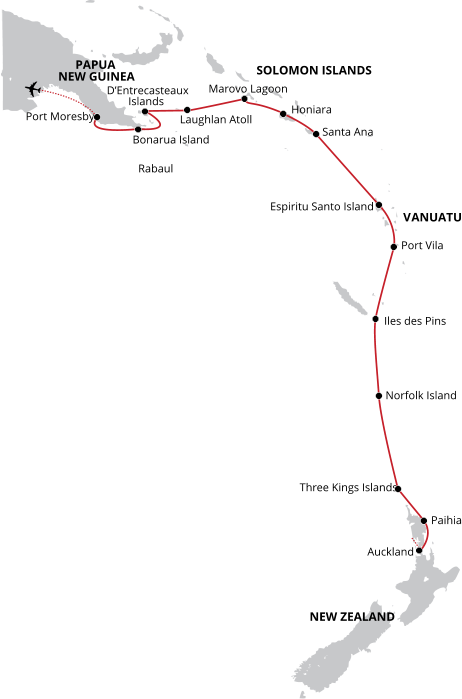
South Seas Islands
Following the trail taken by Captain
James Cook
Our voyage was a fascinating mix of islands
all the way from the northernmost reaches
of New Zealand to Melanesia, taking in
remote, but splendid Norfolk Island and
Iles des Pins in the French Collectivity of
New Caledonia. From there we followed
the chain of Melanesian islands through
Vanuatu, the Solomon Islands and finally to
the islands of Papua New Guinea.
We sailed in a northerly direction through
the South Pacific along much of the same
route as Captain James Cook. The maritime
history of the region is from the early
explorers and native migrations to the
fierce battles of World War II. Many of the
islands still possess a pristine beauty, much
the same as they were when first
discovered by the great explorers.
We landed on many inaccessible beaches
and explored lagoons and coral reefs and
met with many remote communities. At
New Georgia on the outer reaches of the
Solomon’s we snorkelled in the beautiful
Marovo Lagoon, the world’s largest double
barrier lagoon, a truly awe inspiring place.
Many of the islands that we visited are very
remote and way off the tourism circuit.
The islands are all beautiful in their
different ways and all have unique features
and cultures forming one of the most
culturally complex regions of the entire
world, with 1293 languages spoken across
the Solomon Islands, Vanuatu, New
Caledonia and the island of New Guinea. It
is also a region of great antiquity; New
Guinea has been settled for around 45,000
years, the Solomon Islands for 35,000
years, and Vanuatu and New Caledonia for
about 4,000.

Welcome
Our South Seas voyage was a fascinating mix
of islands all the way from the northern Bay
of Islands of New Zealand to Papua New
Guinea, Melanesia.
Our visit to New Zealand South Island took
us through fertile, green, beautiful lands with
spectacular scenery, especially in the
mountains and sea inlets known as Sounds.





People of the Islands
The people of the South Seas Islands originated
from the Melanesian settlers and it was only later
that the Polynesians arrived to settle in these
Islands.
In the Solomon Islands and Papua New Guinea you
can’t fail to notice the dark-skinned locals with
bright blond afros.
Hypotheses about the origins of this golden hair
have included bleaching by sun and saltwater, a diet
rich in fish, and the genetic legacy of Europeans or
Americans. But studies suggest a random mutation
instead, in that the blond hair evolved
independently at least twice in human history.


























